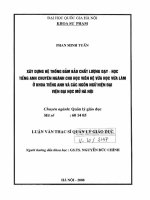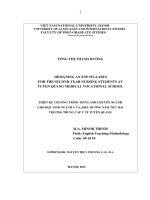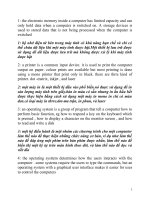TOPIC Tiếng Anh chuyên ngành QLNN Học phần 4 Học viện Hành Chính QG
Bạn đang xem bản rút gọn của tài liệu. Xem và tải ngay bản đầy đủ của tài liệu tại đây (62.8 KB, 2 trang )
The National Assembly of Vietnam = The legislature of Vietnam (100-120 words):
( Quoc Hoi Nước CHXHCN VN)
In Vietnam, the only organ with constitutional and legislative powers is the National
Assembly. The National Assembly has the obligation and power to make and to amend
laws, to work out a program for making laws and decree-laws. Only the President and
other specified bodies may present draft laws to the National Assembly. Laws and
resolutions of the National Assembly must be improved by a majority of its members.
The Permanent Committee of the National Assembly is its Standing Committee, with the
power to interpret the Constitution, the law and decree-law and to enact decree-laws
entrusted to it by the National Assembly.
The State of the SRV (100-120 words): Nha nước VN
The Socialist Republic of Vietnam is the unified state of all nationalities living on the
territory of Vietnam. The State carries out a policy of equality, solidarity and mutual
assistance among all nationalities, and forbids all acts of national discrimination and
division. Every ethnic group has the right to use its own language and system of writing.
The State carries out a policy of comprehensive development and gradually raises the
material and spiritual living conditions of the national minorities. The people make use
of State power through the National Assembly and the People’s Councils, which
represent the will and aspirations of the people, are elected by them and responsible to
them.
The judiciary of Vietnam ( Tư pháp Việt Nam)
The duty of the People’s Court and the People’s Office of Supervision and Control is to
protect socialist legality, regime and people’s mastery. Courts and tribunals established
by law are judicial organs of the SRV. The tenure of office of the President of the
Supreme People’s Court shall be the same as of the National Assembly while that of
other key personnel in courts are determined by law. During a trial, judges and assessors
are independent and shall only obey the law. The courts try their cases collegially and
their decisions shall conform to the will of the majority. The right of the defendant to be
defended is guaranteed.
The Government of Vietnam ( Chính phủ Việt Nam)
The Government is the executive body of the National Assembly and the highest state
administrative body of the SRV. The Government assumes the unified administration of
the implementation of all political, economic, cultural, social, national defense, security
and external activities of the State; ensures the effectiveness of the State apparatus from
the center to the grassroots level; ensures respect for and observance of the
Constitutional law; promotes the people’s right of mastery in national construction and
defense; ensures the stabilization and improvement of the material and cultural life of the
people. The Government is accountable to the National Assembly, the Standing
Committee of the National Assembly and the President of the State. The Government
Structure consists of Ministries and Ministerial level agencies.
The Government of Britain ( Chính Phủ Anh)
The government consists of the ministers who are appointed by the Crown on the
recommendation of the Prime Minister, who is appointed directly by the Crown and is
the leader of the political party which at the time has a majority of seats in the House of
Commons. The Prime Minister is the head of the Government and presides over
meetings of the Cabinet. The Cabinet is the nucleus of government; its members consist
of a small group of the most important ministers who are selected by the Prime Minister.
The size of the Cabinet is today about 23 and its principal function, much of work being
carried out in committee, is to determine, control and integrate the policies of the
government for submission to Parliament.
The Parliament of the UK: ( Nghị viện Anh)
The main legislative body in Britain is the Parliament. It is one of the oldest
representative authorities in the world. Historically, Parliament developed from the
councils that in early times were appointed to advise the King. The British Parliament
consists of two houses: the House of Commons, and the House of Lords. The Queen is
the formal head of Parliament. The House of Commons is an elected chamber and has
more power than the House of Lords. Parliament has direct and exclusive control over
legislation. It can make new laws, replace any of the laws already in force with other
laws, turn conventions into laws, or even overturn established conventions.
The local authorities in Vietnam: (Chính quyền địa phương ở Vn)
In Vietnam, local authorities refer to the People’s Councils and People’s Committees in
the local administrative units. The People’s Council is an organ of State power whose
function is to pass resolutions on the implementation of various measures at a local
level. It represents the will, aspirations and mastery of the people, it is elected by the
local people and is accountable to them and to superior State organs. The People’s
Committee is the executive organ of State Administration at a local level, responsible for
implementing the Constitution, the law, the orders of superior State organs and the
resolutions of the People’s Council.









